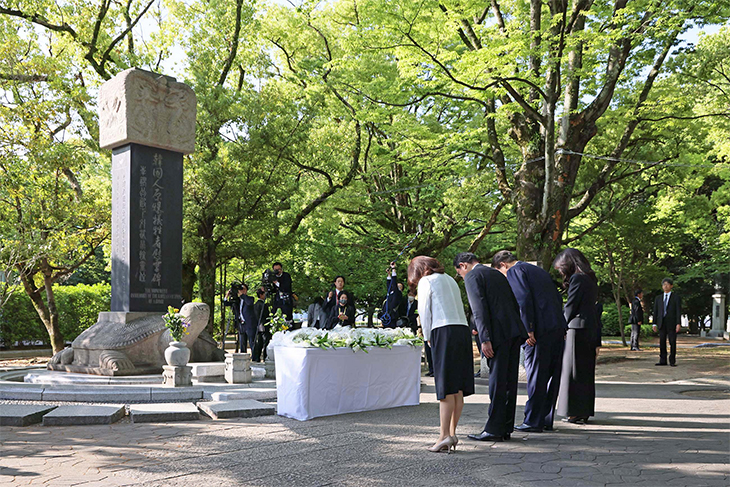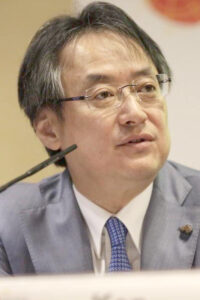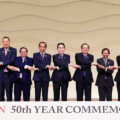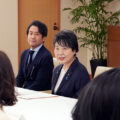The Path Japan and South Korea Ought to Take: Toward Sustainable Cooperation

On May 21, 2023, on the occasion of the G7 Hiroshima Summit, the leaders of Japan and South Korea, accompanied by their wives, laid flowers at the Cenotaph for Korean Atomic Bomb Victims.
Photo: Cabinet Public Affairs Office
Endo Ken, Professor, University of Tokyo
The Current State of the Japan-South Korea Relationship
As far as the Far East is concerned, changes have resulted from the ongoing US-China conflict and the war in Ukraine in three dimensions: the Korean peninsula, Japan-South Korea relations, and the Taiwan situation.
Let us begin with the Korean peninsula. The situation on the peninsula undergoes rapid change. The framework of cooperation that was symbolized by the Six-Party Talks of 2003–2007 has long since broken down, replaced by the bloc-like constellations of Japan, the United Nations, and South Korea on one hand, and China, Russia, and North Korea on the other. In addition to North Korea’s military expansion, both qualitative and quantitative, China and Russia have shifted to positions closer to North Korea in the United Nations Security Council, China-North Korea trade has apparently started to resume, and military cooperation between Russia and North Korea has progressed, all causes for concern. Amid such circumstances, separated by the 38th parallel, North Korea has recognized South Korea as a state, while still regarding it with hostility. It will take some time to determine what this signifies. While North Korea might possibly think it could do anything to South Korea, it has demoted unification from being national policy, which might enable us to draw up a scenario of hostile coexistence.
The second change is in significantly improved Japan-South Korea relations. This change was largely led by Yoon Suk Yeol, President of South Korea, to which Japan also has responded, producing policy content logical from a security perspective. Immediate information-sharing related to missile interception is already underway, while joint exercises are being conducted mainly by the respective navies and air forces. The military closeness between Japan, the United States, and South Korea is indispensable for curtailing North Korea’s outbursts, so it is hoped that this trend will continue and deepen.
The third change is the Taiwan situation. Medium- to long-term preparations need to be made with regard to Taiwan. The results of Taiwan’s presidential election, which ended with a third consecutive victory for Democratic Progressive Party candidates, make it increasingly difficult for China to achieve peaceful unification. However, caution is required as Xi Jinping’s dictatorship deepens and he remains obsessed with Taiwan, with his biological lifespan limited. Beijing’s desire to change the status quo remains unchanged, while its ability to do so grows. Although a full-scale invasion is unlikely, the Taiwanese side needs to prepare for cyber-attacks, missile attacks, a blockade, and other emergency scenarios that may arise from China.
The Path Japan and South Korea Ought to Take
I believe that five concrete measures should be taken with regard to Japan-South Korea relations. The South Korean general election in April 2024, the US presidential election in November, and the political situation in Japan will also affect many things, but the more that is expected of such short-term liquidity, the more it becomes clear that we need to sit down and tackle Japan-South Korea relations in the medium to long term.
First, the step must be taken from competition to cooperation with regards to the respective relationships with the United States. Rather than competing with each other to see which side can get more interest and resources from the US, with the result that neither Japan nor South Korea gains the positive sum of a security environment beneficial to both, we should move in the direction of deepening Japan-US-South Korea cooperation so as to benefit both sides. Trilateral – therefore non-zero-sum — security cooperation between Japan, the United States, and South Korea is highly welcomed, while Japan and South Korea should work together to avoid being swayed by the personality of a US president. On the multi-front of the congress, the executive branch, and think tanks, Japan and South Korea should work together. Bipartisan reporting, scenario planning, and collaborative research should be built up as much as possible during 2024. Doing so will also help to follow up on the cooperative spirit, if not the words, of the Japan-US-South Korea summit agreement at Camp David in August 2023.
Second, it is time to issue a signal to North Korea while strengthening security cooperation between Japan, the United States and South Korea. This must be done by Japan and South Korea.
Since North Korea’s successful development of ICBMs in the late 2010s, the interests of the United States, Japan, and South Korea have slowly diverged. We may have finally reached a point where it remains to be seen if the United States will make sacrifices to protect Japan and South Korea in the event of a nuclear crisis when the possibility of a direct nuclear attack on the United States crosses the mind of the US President even a little. In the meantime, the Biden administration seems to have lost its enthusiasm for the denuclearization of the Korean Peninsula and its will to be directly involved with North Korea. What we are witnessing is the continuation of the “strategic patience” stance with North Korea since the Obama administration, without the name.
What we need to think about now is the possibility of a lower-level military confrontation using conventional weapons as the United States and North Korea confront each other over nuclear weapons. This is akin to the so-called “stability–instability paradox.” As that becomes slowly but increasingly possible, we would have to prepare for military conflicts in various locations. In this case, Japan and South Korea themselves must think about how to maintain peace in the region. This is especially true in the “if Trump” [returns to the White House] scenario.
If North Korea recognizes South Korea, even if it still is as an enemy, there might, in future, be room for the two countries to subtly control arms between themselves, such as with missile launch announcements. Would that not lay the basis for eliminating the risk of preemptive strikes with conventional weapons? It would not deter South Korea’s counterattacks in the event of incidents such as the 2010 Yeonpyeong bombardment. But it would elevate the practice of not attacking the other side if the other side does not attack to a political signal, something that could be shared between North and South. Japan would like to encourage a move in that direction.
It is easy to dismiss such a move as utopian. However, if this situation persists, the confrontation between Japan, the United States, South Korea and China, Russia, and North Korea runs the risk of becoming entrenched, doing nothing to address the serious issue of diverging interests between the United States and Japan and South Korea.
Third, in accordance with the various scenarios of the Taiwan emergency, Japan, the United States, and South Korea need to get on the same page. It is time for a discussion among military authorities about what should be done, what can be done, and what should not be done. In view of the political sensitivity, I think it would be appropriate to first conduct joint research amongst private think tanks.
Fourth and fifth, two things are necessary to ensure that this closer Japan-South Korea relationship becomes socio-economically rooted and sustainable. The first step is promoting common standards and regulations between Japan and South Korea in a multilateral framework. If we continue to exclusively be recipients of the global standard, we will always be forced to make disadvantageous (re)starts. It is also the case that the importance of economic security has emerged, making that possibility ever greater. As such, it is necessary for Japan and South Korea to jointly set standards centered on the three areas of the environment, health, and safety (EHS), as well as to be prepared to involve other countries (especially in Asia) in these standards. By doing so, we maintain the production and export of high-quality goods and services as well as create a structure, so as to jointly create a safe and green region.
It would also be good to come up with common environmental standards for discharges of treated water from nuclear power plants. In the medium to long term, China should be made involved in this standard. Alternatively, with regard to food safety, we can create shared safety standards in anticipation of the future, such as in relation to the issue of import restrictions on agricultural and fishery products from Fukushima and neighboring prefectures.
Japan-Korean rapprochement is not an end in itself. True future-orientation has to do with what we do with that, what we concretely devise and leave behind for the generations to come.
Fifth, there is the issue of historical perception. This has calmed down compared to the period under the Moon Jae-in administration. However, the magma of the Korean people has likely not disappeared. Now that the relationship is good, we should act and do good quietly. The spirit should be one of carrying out symbolic acts such as the leaders of Japan and South Korea and their wives laying flowers at the Cenotaph for Korean Atomic Bomb Victims in Hiroshima. Many of the remains of people from the Korean peninsula in Japan, especially those of civilians, have yet to be returned. Until about 10 years ago, the Japanese government was working on their return. I do not see why we would be cautious about resuming this as a “humanitarian” project. The forces within the ruling party that were vocal in their opposition to concessions to South Korea certainly remain but have retreated somewhat during this period. Another thing would be for public figures to stop by (well-chosen) historical monuments and events in Japan and South Korea to pay their respects, even if it is just in the way of a formal trip. I would hope that the accumulation of such things will be reported at a later date after an election or after a public figure leaves office. In the long run, would it not be wise for Japan’s own national interests to leave behind a track record and memories of such a virtuous cycle being created as Japan-South Korea relations improve?
Translated from an original article in Japanese written for Discuss Japan. [February 2024]
Keywords
- Endo Ken
- University of Tokyo
- Japan-South Korea relations
- Yoon Suk Yeol
- Korean peninsula
- North Korea
- China
- Taiwan
- Russia
- United States
- UN
- Six-Party Talks
- security cooperation
- nuclear crisis
- denuclearization
- economic security
- multilateral framework
- historical perception
- future-orientation





